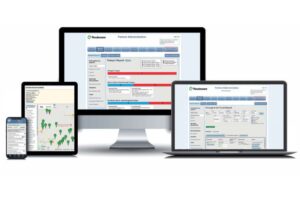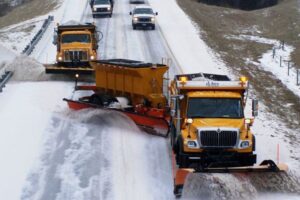When I worked at a private waste hauler, the billing solution wasn’t just another tool; it was the heartbeat of our entire operation. Every invoice, every customer interaction, and every route adjustment hinged on that system. So, it’s no wonder that waste and site service companies face a daunting task when contemplating a change in their solid waste billing software solutions. The right decision can make all the difference.
Let me back up a second. I’m Jed Dawson, VP of Product Engineering at Routeware. As I said, my background is deeply rooted in the waste hauling industry—more specifically, I started my career at my family’s waste company, Paso Robles Waste & Recycling, where I worked as a driver and later transitioned into operations. This hands-on experience, especially with roll-off services, showed me just how challenging and essential operational efficiency is in this industry. I like to call it the most complicated simple business. After all, we just need to collect refuse, bill for it, report on it, ensure compliance, the list goes on. To the layperson, it doesn’t seem that complicated, but when you’re in the midst of the industry, you know that every detail matters, perhaps most so when it comes to waste billing software.
And even then, it’s not that simple. Even as a driver, I saw firsthand the technological gaps in the industry. Working in the office, everything was manual, from route changes to customer service interactions. It was a frustrating experience, not just for us, but for our customers too. Today, technology is finally catching up, at least partially due to Routeware’s suite of waste management software solutions; but it’s important to remember that technology alone doesn’t solve problems. It’s how you integrate it into your operations that determines success.
Technology Innovation in Waste Hauler Billing Software
Over the past decade, I’ve been fortunate to work closely with numerous haulers, seeing how technology can transform their businesses. Whether it’s handling routes more efficiently or scaling operations, technology is the enabler. But without modernizing your processes, you’ll miss out on the full benefits.
This applies to all software, but especially to solid waste billing software. Billing is the heartbeat of any waste- hauling operation. It’s not just about sending invoices; it’s the system that ties everything together—your customer interactions, route management, order dispatching, and your ability to scale as your business grows. Without a robust billing system, you end up wasting time and money on inefficient, manual processes, and ultimately, your customers feel the impact.
While still working at Paso Waste, I faced a situation where our billing system couldn’t keep up with the trajectory of our organization. We had just made a significant investment in on-board computers for our trucks, which we hoped would streamline our operations and make real-time data more accessible across the business. Unfortunately, our existing billing system didn’t play well with third-party technologies. We faced constant integration issues that resulted in manual workarounds, which not only eroded the efficiencies we expected but also diminished the value of having advanced technology in our trucks.
This was both a technology issue and, equally important, a cultural issue. The provider we were working with wasn’t invested in partnering with us to solve these integration challenges. Their focus and roadmap simply didn’t align with where we were headed as an organization. After several attempts to work around the problem, we realized it wasn’t just the technology that needed to change—it was our partnership. We needed a billing solution that was more forward-thinking and adaptable to the evolving needs of our operation, and one that would be able to help us in making the cultural changes necessary for this partnership to be optimally valuable. We ultimately made the decision to switch to a provider who shared our vision and was committed to helping us unlock the full value of the technology in our trucks.
Finding the Right Waste Billing Solution
This experience taught me that choosing a waste hauler billing software system isn’t just about features or cost. It’s about finding a partner who aligns with your business both technologically and culturally. Some haulers may prioritize working with providers who offer cutting-edge solutions and are always pushing the envelope with new innovations. These haulers might be experimenting with AI, automation, or advanced data analytics, and need a partner that’s willing to evolve quickly with them.
On the other hand, some haulers might value resiliency and stability over innovation. They may need a partner who focuses on consistency, reliability, and a slower, more cautious approach to adopting new technologies. Neither approach is right or wrong; it’s about what’s right for your business. But the key takeaway is this: you need to ensure that the system you choose—and the company behind it—can support your growth and match your vision for the future.
Keep these questions in mind as you evaluate waste billing software solutions:
- How do we, as haulers, manage customer relationships to provide a great experience for our customers and users?
- Will our billing system scale as we grow?
- How will we integrate with in-cab and on-board technologies?
- Are we ready for the cloud?
- How can we stay ahead of compliance mandates?
Waste Hauler Billing Software Built for Growth
One of the biggest mistakes haulers can make is investing in a system that meets their current needs but can’t handle the complexities of a larger operation. Your business processes are only going to get more complicated as you grow, and your billing system should simplify, not add to that complexity.
My Waste Hauler Billing Software Essentials:
- Simpler workflows and connected systems: As you grow, adding more vehicles, routes, and services, the complexity of your operations naturally increases. However, your waste hauler billing system should simplify these workflows, not complicate them. This is where having a single ecosystem that covers a wide range of business processes is crucial. You don’t want your team bogged down by disconnected workflows or multiple systems that don’t talk to each other.
- Integration with in-cab and onboard technologies: Your billing system needs to integrate with in-cab systems, GPS tracking, route optimization tools, and onboard diagnostics technologies to create a streamlined operation. These integrations remove operational silos and let your technology do the heavy lifting.
- Open systems: In my experience, having a system with open architecture and an open API is key to this kind of scalability. A closed-off system that doesn’t integrate well with third-party software can become a bottleneck for your business, and you may be tied into a contract that exacerbates the issue by not letting you promptly switch. When I was at Paso Waste, one of the reasons we had to switch systems was because our billing platform couldn’t integrate with the in-cab technology we had invested in, slowing us down and creating inefficiencies that limited the operational value of both solutions.
- Software that grows with you: I’ve seen haulers go from managing just a handful of trucks to operating fleets of hundreds, all while scaling seamlessly on a single platform. One customer, who started with fewer than 10 trucks, grew to more than 150 vehicles using our SaaS platform. The beauty of SaaS is that you don’t need to worry about costly upgrades or rebuilding your systems as you grow. You’re always on the latest version, with the latest features, and as your business scales, your software grows with you. There’s no need for downtime or disruptive migrations. This allows you to stay agile and ready for the next phase of growth, without the technology holding you back.
Ultimately, your waste hauler billing system should be designed not just for where you are today but where you want to be tomorrow. By choosing a system with open architecture, connected workflows, and seamless integration with 3rd party technology, you’re positioning yourself for growth. You won’t have to worry about whether your system can keep up as you add more vehicles, expand into new territories, or adopt new tools to enhance your operation.
As you plan for future growth, ask yourself these questions: Will your system allow you to scale effortlessly? Does it integrate with the other technologies that are core to your operation? Is it flexible enough to meet your evolving needs? Choosing a system that can answer ‘yes’ to these questions will set your business up for long-term success.
Get Started today.





